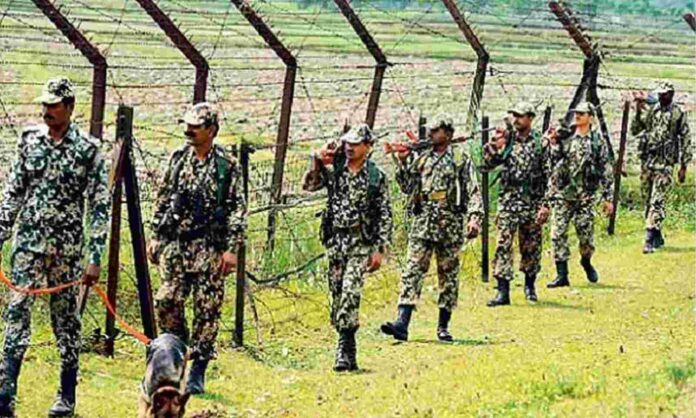On 11 October 2021, the Ministry of Home Affairs (MHA) through a Gazette Notification, modified the areas of jurisdiction for the Border Security Force (BSF) to exercise its powers in the states bordering Pakistan, Bangladesh and Myanmar. According to the new Notification, the BSF’s jurisdiction now comprises “the whole of the area in the States of Manipur, Mizoram, Tripura, Nagaland and Meghalaya and Union Territories of Jammu and Kashmir (J & K) and Ladakh and so much of the area within a belt of fifty kilometers in the States of Gujarat, Rajasthan, Punjab, West Bengal and Assam, running along the borders of India”. This Notification, in effect, amends the 3 July 2014 Notification by increasing the area of jurisdiction of the BSF in Punjab, West Bengal and Assam to 50 km from existing 15 km, while reducing the area in Gujarat to 50 km from existing 80 km. There is no change in the area of jurisdiction of the BSF in the north-eastern states and the union territories of Jammu & Kashmir and Ladakh.
By Pushpita Das
Reasons for Jurisdictional Changes
This decision of the MHA is apparently triggered by national security concerns following the recent developments in Afghanistan.2 Apprehensions are raised that the taking over of Afghanistan by the Taliban has emboldened anti-India elements in the Af-Pak region, and, as a result India might witness heightened incidents of cross-border terrorism in future. This concern is reinforced by the concomitant rise in terrorist attacks in J & K as well as an increase in the incidents of arms being dropped by Pakistani drones in Punjab. At the same time, concerns regarding illegal migration, cattle smuggling, trafficking in person and narcotics as well as smuggling in fake Indian currency notes (FICN) along the Bangladesh border continue to persist.
BSF’s Response
The BSF has welcomed the decision of the MHA. In its official statement released to the press, the organisation said, “The amendment will aid the border guarding force in effectively curbing trans-border crimes and the new amendment brings in ‘uniformity’ for its operations in the border states of Punjab, West Bengal, Gujarat, Rajasthan and Assam where it can now operate within a 50 kms area from the border”.3 For instance, in Punjab, where the drones from Pakistan intrude far deeper than 15 km to drop the weapons, the increased jurisdictional limit will enable the BSF to track and destroy them effectively. Similarly, in West Bengal and Assam, the cattle smugglers and criminals operate from the hinterland, and despite credible evidence/intelligence, the BSF is unable to nab them. Now, with the increase in their operational limits, the force will be able to conduct raids and make arrests deep inside the state.
Changes Made in the BSF’s Power
It is important to note that the new Notification empowers the BSF to search, seize and arrest only in respect to the Passport Act of 1967, the Passport (Entry into India) Act of 1920, and specified sections of the Criminal Procedure Code (CrPC) in the extended area of its jurisdiction. The BSF’s powers and duties regarding other central acts such as the Customs Act, the Central Excise and Salt Act, the Narcotics and Psychotropic (NDPS) Act, the Foreign Exchange Regulation Act, 1947, etc., do not apply to the extended area of jurisdiction and remain same as earlier, that is, 15 km for Punjab, West Bengal and Assam and 80 km for Gujarat. In other words, the emphasis is laid on prevention of illegal migration and cross-border crimes. Further, the Notification does not provide the BSF the power to investigate and prosecute, which implies that the BSF still has to hand the arrested person and the seized consignments over to the State Police within 24 hours after minimal questioning.
Reaction to the Changes
Predictably, the Notification has attracted a wide spectrum of reactions from political parties as well as security analysts and academics depending upon their political leanings. While the BJP-ruled Assam government has welcomed the decision and expressed confidence that in coordination with the state police, the amendment will help defeat cross-border smuggling and illegal migration, the Congress-ruled Punjab and the Trinamool Congress-ruled West Bengal governments have termed it “a direct attack on federalism” and “an infringement on the rights of the state”.
Significant here is to mention that, the United Progressive Alliance (UPA) government in 2011, had attempted to extend the jurisdictional limits of the BSF to the entire country. For this purpose, the Border Security Force (Amendment) Bill in Rajya Sabha was introduced in the Rajya Sabha wherein it was proposed to amend the BSF Act by deleting the words “adjoining the borders of India” and, inserting the words “or in any part of the territory thereof” after the words “borders of India”. This amendment was considered necessary given the expansion of the role of the BSF as the force was deployed in various states for counter-insurgency and anti-Naxal operations, internal security duties as well as for assistance during natural calamities. While arguing for the amendment, the then Home Minister, P. Chidambaram had said that such enabling provisions already existed in the Acts governing CRPF, ITBP and SSB.
As regards the new notification, the MHA had notified that the amendment has come into force on 11 October 2021. However, the BSF Act under Section 139 (3) requires the government to lay the notification before each house of the Parliament within 30 days for the members to raise a motion for discussion, modification or annulment of the notification. Unless the amendment is approved by the Parliament, the notification cannot come into force. Meanwhile, the Parliamentary Standing Committee on Home Affairs, acquiescing to the demands of the TMC members, has agreed to discuss this notification and added it to the list of agenda.
Voices of Concern from Within BSF
As far as the BSF is concerned, the decision has generated mixed reaction. While it has welcomed the extension of their jurisdiction in the three states, sections within have pointed out to the practical difficulties in their functioning. To begin with, the BSF officers revealed that the BSF personnel on the ground do not effectively utilise the powers vested upon them even within the existing 15 km belt because they are not conversant either with the Acts or the various sections of the CrPC, which empower them in their area of jurisdiction. That is why more often than not, they had to depend on the local Police while conducting search and seize operations or arrest suspected criminals, especially in populated areas.
They further stated that the BSF shares an excellent working relationship with the state police. In fact, most of the raids and arrests that are conducted are in close coordination and cooperation with the local police. Even in states where vested political interests malign the BSF and instruct their police not to cooperate with the force,11 the Police do act against any smuggler or criminal if the BSF provides irrefutable evidence. They, however, feel that the new notification could potentially generate bad blood between the BSF and the state police because the police might perceive the enhanced jurisdiction as an infringement on their powers. In fact, a few police officers have expressed concerns that the BSF might conduct arbitrary raids and arrests on the behest of the Union government. Besides the State Police, the BSF officers argue that the people in the border areas, in general, resent their presence. Some of the officers even accept that they have not been successful in garnering the support of the people in border areas. They lament that the notification will further aggravate the situation as the people in the hinterland will now also raise their voice against the force. Consequently, the BSF will have to grapple with the resentment of both the police as well as the people of these states.
A few BSF officers also expressed their dissatisfaction with the attitude of the Police and the Customs department towards crime. They argue that when an illegal infiltrator or a smuggler is handed over to the local Police, they either set him/her free under political pressure or because of financial incentives, which negates the hard work put in by the BSF. Furthermore, in case of cattle smuggling, after the BSF hands over the cattle to the Customs officials, they auction the cattle. However, since the Customs officials are not careful in screening the customers, these cattle are bought back by the smugglers who then smuggle the consignment to Bangladesh.
Given these constraints, some of the officers argue that the BSF should be given additional power of investigation and prosecution so that trans-border crime can be curbed effectively. This view is not shared by others who argue that investigation and prosecution will require additional manpower and resources and detract the BSF from their original mandate of acting as the first line of defense against external threats. They instead propose that the BSF officers should be given the authority to hand over such cases which they consider to be extremely sensitive to central agencies such as National Investigation Agency (NIA), Narcotics Control Bureau (NCB), the Central Bureau of Investigation (CBI), Customs, Directorate of Revenue Intelligence (DRI), etc., instead of the local police. They also demand that the BSF should be given the power to monitor the telephonic conversation of the criminals who are active in the border-belt areas. It is moot whether these demands of the BSF officers are feasible.
Conclusion
In sum, the notification appears to be a welcome decision. However, for it to be effective the BSF has to concentrate on training their personnel about various Acts and sections of the CrPC. At the same time, emphasis must be laid on the sensitising the personnel on the local customs, traditions and languages so that the BSF can initiate a dialogue with the border inhabitants and encourage them to support the efforts of the force in making the border areas secure and peaceful. The union government, on its part, should formulate guidelines for the operationalisation of the notification in order to mitigate any confusion that may arise. It should also establish structures such as district and state coordination committees and appoint nodal officers to achieve better synergy among all the agencies concerned.
This article first appeared in www.idsa.in and it belongs to them.












